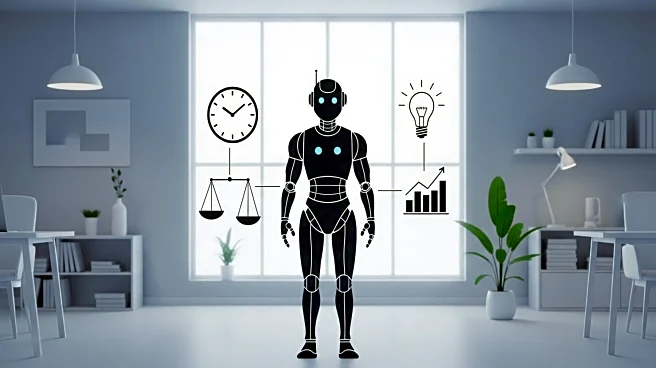What's Happening?
Artificial intelligence is being increasingly utilized by companies to address the issue of burnout among employees. Burnout, recognized by the World Health Organization as an occupational phenomenon, is a significant concern for businesses, costing U.S. companies between $4,000 and $21,000 per employee annually. AI tools like ChatGPT and Copilot are being employed to automate repetitive tasks, summarize information, and assist with content creation and project management. A study by the University of Melbourne and KPMG International found that 58% of employees globally use AI at work, with one-third using it weekly or daily. Despite these advancements, many workers still spend a significant portion of their workweek on tasks that AI could handle, according to a survey by GoTo and Workplace Intelligence.
Why It's Important?
The integration of AI tools in the workplace is crucial as it can significantly reduce emotional exhaustion among employees, as evidenced by a 25% drop in emotional exhaustion in workplaces using AI tools. AI systems can identify employees at risk of burnout, allowing for early intervention strategies. This not only enhances productivity but also supports employee well-being, which is vital for maintaining a healthy work environment. Companies that effectively leverage AI can improve operational efficiency and employee satisfaction, potentially reducing costs associated with burnout.
What's Next?
As AI continues to be integrated into workplace operations, companies may need to address the balance between AI assistance and workload management. While AI can lighten the cognitive load, it may also lead to increased expectations and responsibilities for employees. Organizations might need to implement regular workload check-ins and feedback mechanisms to ensure tasks remain balanced and manageable. The role of AI in mental health support is also expanding, with tools like Headspace's AI companion Ebb being used to manage workplace stress and anxiety.
Beyond the Headlines
The ethical implications of AI in the workplace are significant, as companies must navigate the balance between technological assistance and human workload. There is potential for AI to transform workplace dynamics, but it requires careful management to avoid exacerbating stress and burnout. The long-term impact of AI on employee roles and responsibilities will likely continue to evolve, necessitating ongoing dialogue about the ethical use of AI in business settings.









